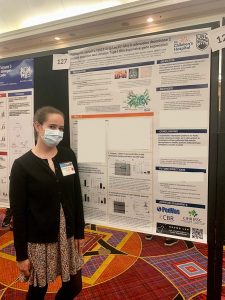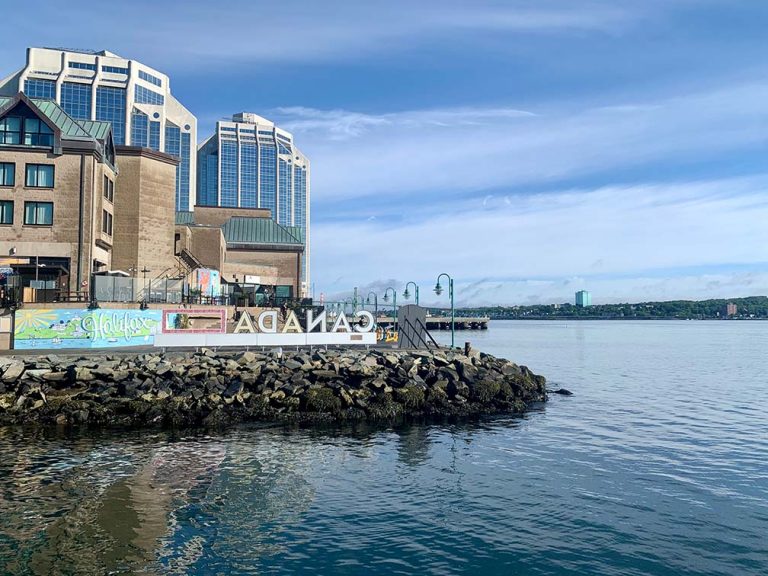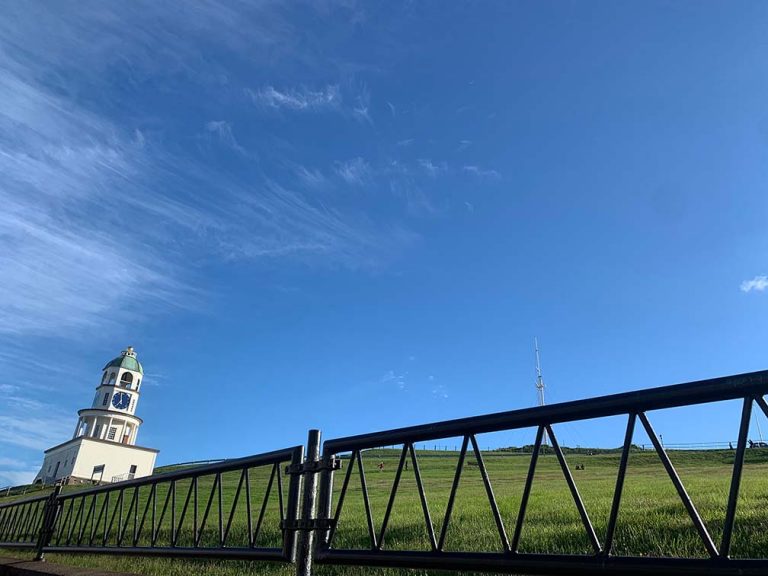 Written by: Sarah Bowers, PhD Candidate, Brown Lab
Written by: Sarah Bowers, PhD Candidate, Brown Lab
Supervisor: Dr. Kelly Brown
Conference: Canadian Society for Immunology (CSI) 34th Annual Conference, June 17-20, 2022
Location: Halifax, Nova Scotia, Canada
Poster Presentation Title: Pathogenic variant c.1052T>A (p.Leu351Gln) in adenosine deaminase 2 impairs protein secretion and elevates Type I IFN signaling.
Bowers SM, Sundqvist M, Gibson KM, Dancey P, Cabral DA, Brown KL

Sarah Bowers presenting a poster talk1.
The Centre for Blood Research (CBR) Travel Awards support graduate student, postdoctoral fellow, research associate, and clinical trainee attendance at scientific meetings and training workshops. Not only can awardees present their research, but they can also access networking opportunities and gain insight into cutting edge research and technologies.
I am grateful to have received a CBR Travel Award to support my trip to the 34th annual Canadian Society for Immunology (CSI) Conference at the Halifax Marriott Harbourfront Hotel (Halifax, NS), June 17 – 20, 2022. The CSI fosters and supports Immunology research throughout Canada and organizes an annual meeting that traditionally alternates between Eastern and Western Canada. It was my first time attending, and I was excited to visit Halifax and travel nationally for a conference.
The CSI Conference consisted of three symposia: (1) Opposing Inflammatory and Suppressive Regulation of Anti-Tumor Immunity, (2) Immune Development and Layered Immunity, and (3) Primary Immune Deficiencies: From Thymic Developmental Defects to Dysregulation & Inflammation (jointly hosted by the CSI and Clinical Immunology Network-Canada). A highlight was the Bernhard Cinader Award lecture, named in honour of a founding member of the CSI and its first president, given by this year’s awardee Dr Brad Nelson (BC Cancer, UVic, UBC). Dr Nelson spoke to 30 years of experience in the cancer immunotherapy field and an optimistic view for the future of treatments.
As a trainee, I really appreciated the variety of sessions that encouraged interactions and provided opportunities to “talk science”. I feel that the breadth of immunology subjects that the CSI unites created opportunities for both detailed discussions on niche subjects and introductions to new topics. I attended workshops on leukocyte development, activation and signaling, as well as immune-mediated diseases. These topics are particularly relevant to my doctoral work in the Brown Lab, which looks at human immune cell development in a disease called ‘Deficiency of Adenosine Deaminase 2’, or DADA2 for short.
As a trainee, I really appreciated the variety of sessions that encouraged interactions and provided opportunities to “talk science”. I feel that the breadth of immunology subjects that the CSI unites created opportunities for both detailed discussions on niche subjects and introductions to new topics.
I had the opportunity to present a poster1 describing our work on the p.Leu351Gln (L351Q) variant in ADA2, identified in patients with DADA2. I was excited to share our data, which reveals impaired secretion of L351Q ADA2 and elevated type I interferon responsive gene expression in L351Q ADA2 expressing cells1,2. Split over two evenings, this was the biggest poster session I have ever attended. I was inspired by the quality of work and the ability of speakers to describe their work in comprehensive yet succinct ways.
Overall, I really enjoyed my trip to Nova Scotia, the CSI Conference, and exploring the Halifax harbourfront. A big thank you to the CBR for supporting this opportunity!
Learn more about the CBR Travel Awards and how to apply.
- The view of Halifax from Dartmouth.
- Walking on the harbour in front of the conference hotel.
- Halifax Citadel National Historic Site.
1 Bowers SM, Sundqvist M, Gibson KM, Dancey P, Cabral DA, Brown KL. Pathogenic variant c.1052T>A (p.Leu351Gln) in adenosine deaminase 2 impairs protein secretion and elevates Type I IFN signaling. Poster and Abstract. Canadian Society for Immunology (CSI) 34th Annual Conference, Halifax, Nova Scotia, Canada. 2022 Jun 17-20.
2 Bowers SM, Sundqvist M, Dancey P, Cabral DA, Brown KL. Pathogenic variant c.1052T>A (p.Leu351Gln) in adenosine deaminase 2 impairs secretion and elevates type I IFN responsive gene expression. Front Immunol. 2022 Sep 30;13:995191. doi: 10.3389/fimmu.2022.995191. PMID: 36248868.





